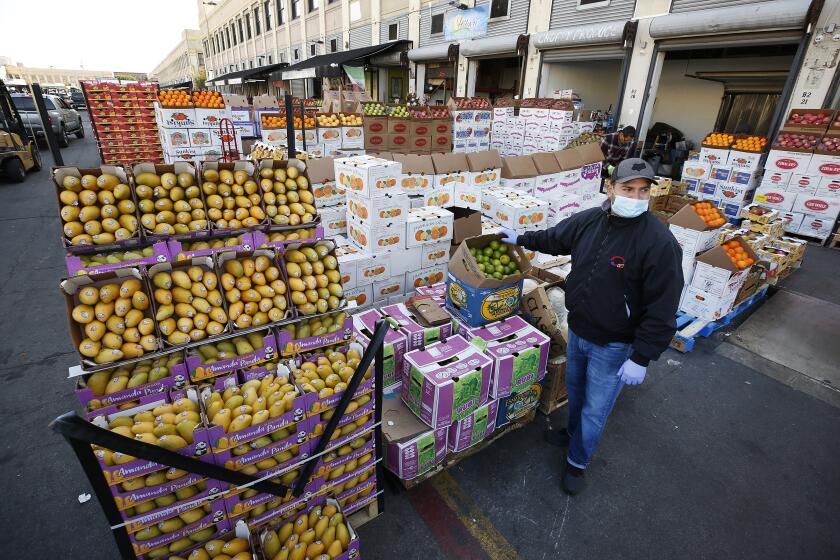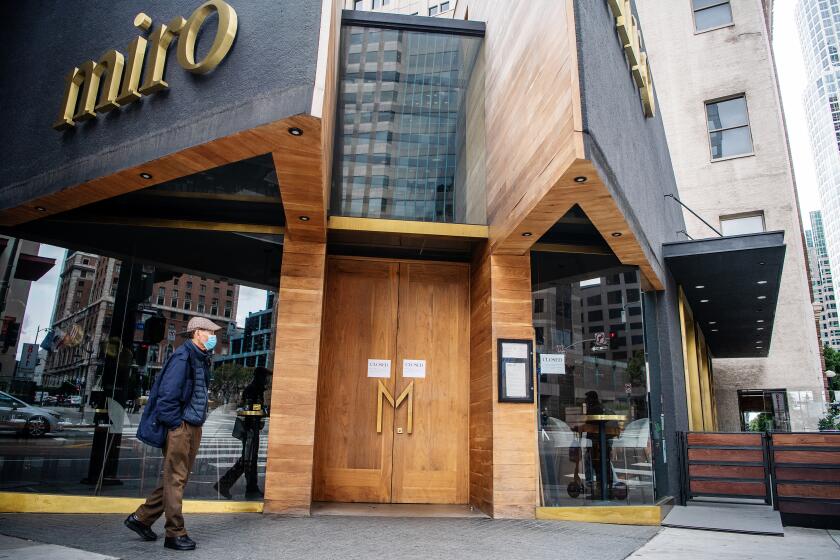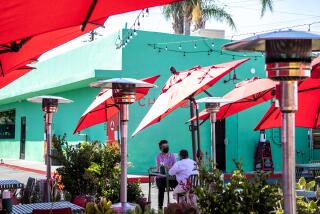L.A. restaurants can officially sell grocery items
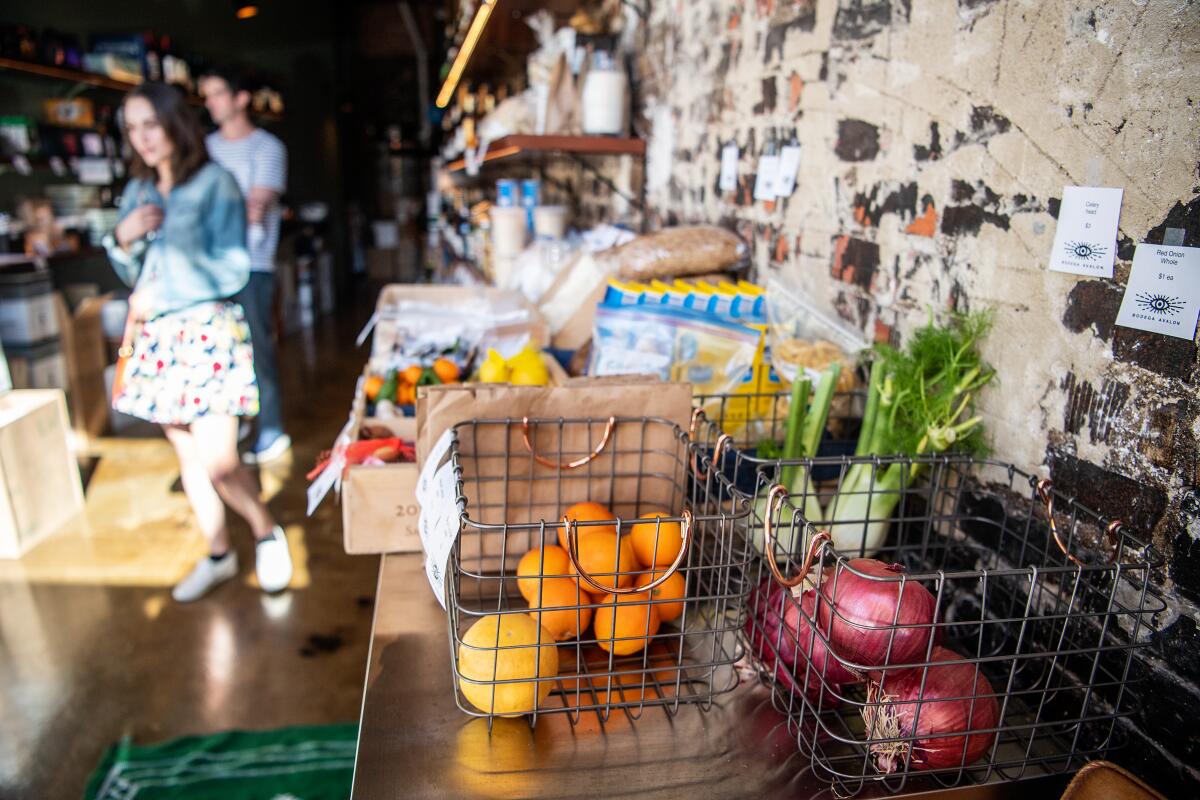
- Share via
L.A. restaurants that have turned empty dining rooms into ad hoc corner markets — selling pantry staples, dry goods and more to stay afloat amid a forced shutdown — can continue to do so for takeout or delivery, according to an email from the Los Angeles County Department of Public Health.
“Public Health is allowing restaurants to offer grocery items as part of their menu for takeout, pickup and delivery,” a department representative wrote in the email sent to The Times on Tuesday.
The Los Angeles County Department of Public Health has developed guidelines to help restaurants safely offer grocery items for delivery or takeout.
After word of some restaurant markets being shut down last week, many restaurant owners have been confused about whether they are allowed to sell groceries.
On Friday, the Playa del Rey location of Mediterranean restaurant Bacari, which had been using its dining room as a market, was shut down by the L.A. County Public Health department.
Owners Robert and Danny Kronfli told The Times that the county health inspector shut them down for allowing customers to walk in, browse and touch market produce on display inside the restaurant.
“We tried a back-and-forth conversation to come up with some kind of compromise to stay open, but the answer we kept getting from him was that we simply don’t have a grocery permit,” owner Robert Kronfli said.
Vendors at 7th Street Produce Market have been hit hard as retailers cut orders due to the coronavirus shutdown
“We understand it’s coronavirus and these are unprecedented times. We’re just trying to survive, keep our staff on payroll and get supplies to the neighborhood.”
Bacari has since worked out a compromise with the county that allowed it to reopen for takeout and grocery delivery only.
Part of the confusion for restaurant-retailers seems to lie in a disconnect between city and county.
Asked last week if he was aware of restaurants being shut down for not having the correct licenses for selling grocery items, Mayor Eric Garcetti seemed to side with the restaurants.
“I think this is absolutely a time for people to be creative, to relax whatever rules as long as people are operating with safe distancing in critical businesses to help people get food and to help people survive,” he said during a Friday press briefing. “That’s my philosophy, but that is a call for County Public Health.”
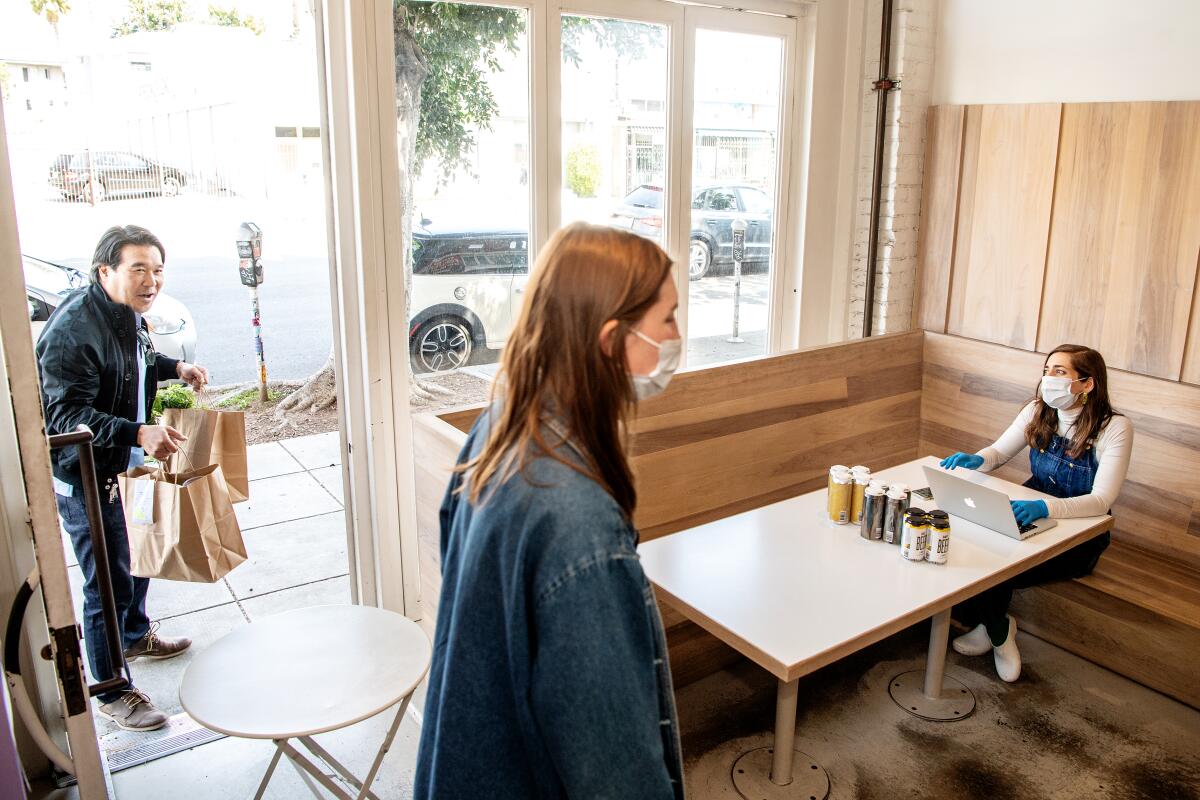
In a Monday afternoon press briefing, Los Angeles County Public Health Director Barbara Ferrer signaled the county was taking a harder stance.
“It’s not really possible for a restaurant to become a grocery store,” Ferrer said.
“Anybody who wants to be a grocery store does need to get licensed,” she said.
Reports of restaurant-run market closures also sparked confusion in Long Beach, which has its own health department. City officials said Tuesday that they are trying to work out a compromise that allows the pop-up markets to continue operating.
“We have restaurants that have transitioned to bodegas selling fruits and vegetables and food, and so that’s something our health department is trying to make work,” said Mayor Robert Garcia. “I’ve been to some of these, they’re very well taken care of, they’re using physical distancing. We want to work with them to make sure they’re safe spaces. … We have not in any way asked them to close.”
Garcia said he expected health officials to offer guidance on the pop-up markets as well as farmers markets in the next day or two.
“We want to make sure people have access to food and do it in a way that’s safe,” he said.
On Monday, the Los Angeles County Department of Public Health emailed new suggested restaurant retail guidelines to the mayor’s office, according to a city official who was not authorized to comment on the matter. Recommendations include listing grocery items on restaurant menus for delivery or takeout and prohibiting restaurants from setting up stores in dining rooms for self-selection, “as this defeats the purpose of closing dining rooms to customers.”
L.A. restaurants shut down for a month because of coronavirus spread
Many restaurants have been counting on the new retail business model to stay afloat. It helps supplement the little revenue generated by takeout orders and makes their restaurants one-stop shops for prepared food and essential household items. Among the businesses that have added grocery items since the shutdown: Kismet, Yang’s Kitchen, Go Get Em Tiger, Bar Avalon, Lady & Larder, Masataco, Maude, Poppy + Rose and others.
“We need to know more,” said Patti Röckenwagner, co-owner of Röckenwagner Bakery in Mar Vista. “Aren’t people allowed to touch fruit or produce at regular grocery stores or farmers markets?”
Like other businesses, Röckenwagner Bakery has ramped up its retail offerings and safety measures.
The bakery now sells CSA-style produce boxes, flour, canned goods, bottled water, butter and cheese, and is adding another cold case for grab-and-go sandwiches and meals. The cafe installed a sneeze guard between the cashier and customer, and there is tape on the floor to ensure social distancing between customers.
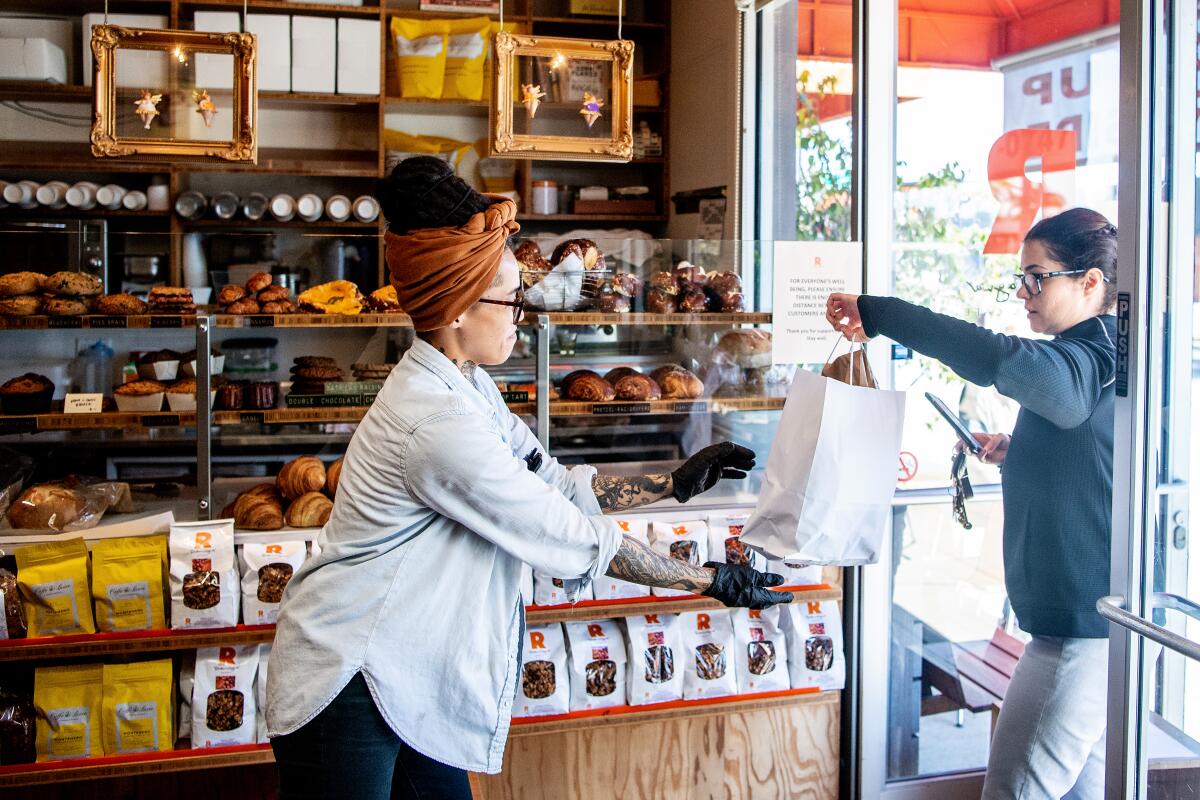
Grocery permits and social distancing are two things chef and restaurateur Jeremy Fox never thought he would have to consider.
Fox started selling flour, yeast, produce and meat by the pound at his restaurant Birdie G’s shortly after the shutdown.
“Thursday night our No. 1 seller was limes,” Fox said. “More limes than matzo ball soup. That was very telling of what’s going on right now.”
His restaurant has a nobody-allowed-in policy that he hopes puts him ahead of the curve if and when new restaurant retail guidelines are put in place.
“We actually set up shelving in the restaurant for all this stuff, but we’re not allowing entry anymore,” he said. “The staff feels a lot safer if it’s all just taken outside curbside.”
Minh Phan, who pivoted her Historic Filipinotown restaurant Porridge + Puffs into a provision shop selling hot sauce, cold brew, pickles, sesame oil and bulk grains alongside the restaurant’s takeaway dishes, has decided to steer clear of grocery items altogether.
“I’m not getting in the game of toilet paper or eggs. We’re going to stay away from selling things you can get at Vons or Whole Foods,” she said. “If they tell us to stop doing something, I’ll stop doing it.”
Briana Valdez, the owner of breakfast taco joint HomeState, was rattled by the Bacari shutdown.
On March 28, she received a call from Safe and Sound Food Safety Consultants, a local firm that works with her restaurant and about a hundred others in the Los Angeles area, including République and Osteria Mozza.
“I got a call from them saying, ‘You might be in jeopardy because you’re selling toilet paper and you’ve never sold toilet paper before. You guys could be looked at as operating as a grocer and you don’t have a grocer’s license,’” Valdez said.
Valdez immediately dropped nonfood sundry items from HomeState’s menu and has removed any signage referring to the restaurant, which has three locations in Los Angeles, as a “general store.”
She feels restaurants can play an important role in feeding communities during the coronavirus outbreak and hopes that government officials will give restaurants a break.
“If we can keep people out of crowded grocery stores and provide them with a ready-made meal for their family — and a gallon of milk for the week — how is that not OK?”
More to Read
Eat your way across L.A.
Get our weekly Tasting Notes newsletter for reviews, news and more.
You may occasionally receive promotional content from the Los Angeles Times.
